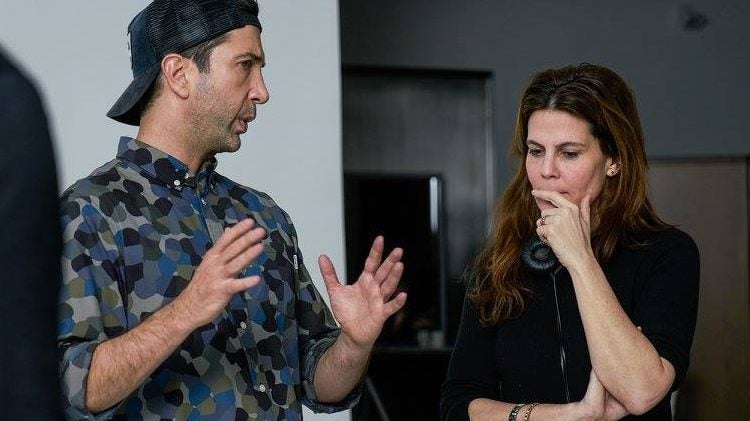David Schwimmer’s sexual harassment videos ring true because they were written by a woman
In a scene from The Actor, a new film, the titular character stands in his briefs, waiting for a costume dresser, a woman, to select an outfit for his next set appearance. The two talk and joke with each other about a family birthday party. Pretty standard. Except, as the dresser looks away, the actor frees his penis from his jockeys.


In a scene from The Actor, a new film, the titular character stands in his briefs, waiting for a costume dresser, a woman, to select an outfit for his next set appearance. The two talk and joke with each other about a family birthday party. Pretty standard. Except, as the dresser looks away, the actor frees his penis from his jockeys.
She turns around, is stunned, but immediately begins to laugh it off.
Her: Come on, what are you doing?
Him: I’m not doing anything. He’s got a mind of his own.
Her: A mind of his own. Ohhhhh, okay.
There is so much truth in this exchange, it hurts.
For several beats, the woman desperately tries to keep the mood jocular, probably hoping the surreal moment will pass. She is unconsciously, instinctively offering the man an out: he could put everything away and pretend it was terrible prank, but he doesn’t. And so her nervous giggles continue, which feels perfectly natural to viewers. It’s the way women are socialized to react to tension and inappropriate behavior in a man, especially a superior, and one who is also supposed to be a friend.
This painfully authentic film isn’t playing in theaters. Rather, it’s one of the short videos created for last year’s #ThatsHarassment series co-produced by David Schwimmer, the actor still best known as “Ross” from the sitcom Friends, and written and directed by Israel’s Sigal Avin. The videos debuted on Facebook last April, several months before the the #MeToo movement was revived by Hollywood stars, and now they’re enjoying a second wave of attention. You can find them playing on Hulu, Amazon, CBS, Fox, Showtime, and on the tiny screens inside New York City taxis.
Recent headlines about #ThatsHarassment, including the one above this story, have called out Schwimmer’s name. To be sure, he’s the recognizable one, and his celebrity commands the attention of readers. But, it seems a shame that Avin, who wrote and directed the videos, appears to be getting a backseat.
Yes, the films stand out partly because, unlike anti-harassment corporate training videos, they feature top-notch actors such as Cristela Alonso, Noah Emmerich, Cynthia Nixon, and Bobby Cannavale, and the production quality is high, but it’s the script and stories at the core of the work that give the stories the right psychological complexity, making women who have lived through those moments a little queasy.
Where PSAs and corporate anti-harassment videos tend to forget the subtleties—sometimes don’t even feature women as the victims of harassment, even though they are in the vast majority of cases—these videos forgo blunt devices. Their strength is in the micromoments—like “A mind of his own? Ohhhh, okay”—which give the stories texture and truth.
I’ll say it: I don’t think a man working alone could have created videos this sensitive to the plights of women caught off guard by casual, even “mild” harassment. It’s not that I believe men can’t create work that feels authentic to women, or that writers of one race or gender can not capture the experience of another, it’s just that it’s rare for such attempts to be so exceptionally successful, as these are.
Avin first made versions of the films in Israel before joining forces with Schwimmer in the US and reshooting the movies in English with American actors. All of the dramas are actually inspired by real-life incidents that have either happened to her, or that friends have described to her. Her writing and direction are the real stars here. (And her talent has not been missed by Hollywood: In 2014, Variety called her one of 10 TV scribes to watch.)
In “The Boss,” for example, Schwimmer, playing the sleaze-ball manager, talks to a young female employee about her promotion and pay raise, for which she’s obviously proud. The come-on follows, and the juxtaposition perfectly demonstrates why sexual harassment can, for some women, erode a person’s sense of confidence and self-esteem. The same thing happens in “The Politician,” in which a public figure being interviewed by a journalist heaps praise on the female reporter, whom he calls, “intelligent” and “very strong,” before he moves in.
The effects of this kind of experience are multi-layered. But, as the #MeToo stories and harassment studies have revealed, one of the consequences for many women is crippling, lingering doubt. “Did I deserve this job, or has this always been about sex? About my appearance?” she’ll ask herself. Even if the woman were to stay, accept the promotion, have the man removed, the damage is done. The system has been served.
Avin and Schwimmer have co-created mini-films worthy of the industry’s highest honors. (And, psst, employers: they’ve partnered with the NWLC to make a toolkit for you, too.) And it’s her sensibility that give the narratives the power to reflect these situations back to us with emotional clarity. (She made the films, she has explained, because people would say they didn’t know what harassment was. Now they do.) So let’s make sure she gets the kudos she deserves.